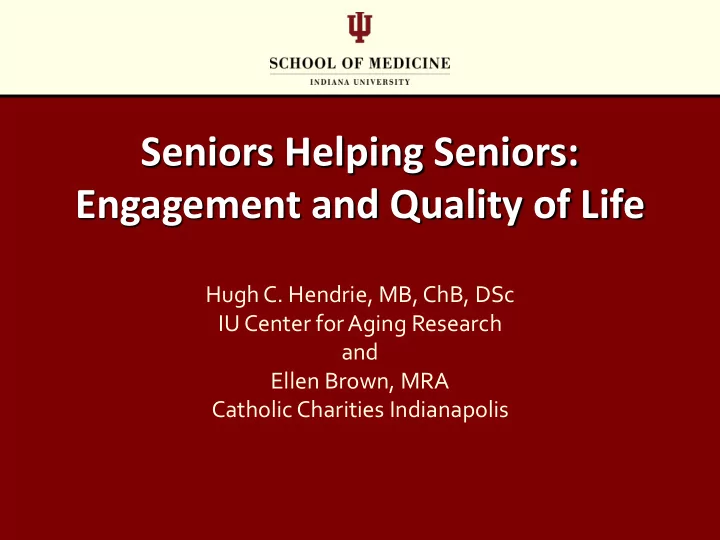

Seniors Helping Seniors: Engagement and Quality of Life Hugh C. Hendrie, MB, ChB, DSc IU Center for Aging Research and Ellen Brown, MRA Catholic Charities Indianapolis
Acknowledgments This study was funded by the Indiana Clinical and Translational Sciences Institute #TR001107 NIH, National Center for Advancing Translational Sciences and the Indiana State Department of Health. We gratefully thank the Senior Companions for their participation. Presenters have nothing to disclose.
We also acknowledge our colleagues… Yvonne Lu PhD, IU School of Nursing Joyce Beaven MSW, CICOA Karen Hanson BS, Catholic Charities Indianapolis Sula Hood PhD, IU School of Public Health Carly Carvell MD, Franciscan Health Mary Guerriero Austrom PhD, IU School of Medicine
Recipe for Healthy/Successful Aging • Diet • Exercise • Engagement – Cognitive – Social – Volunteerism • Senior Companion Program
Pilot Study Aims To identify the elements of participation in the SCP by urban, poor, African American elderly that lead to positive outcomes in psychological wellbeing and quality of life. To determine elements of the SCP that helped create success in SC; what works well in the program; what can be modified; and how to best prepare other older adults to be participants. To test the acceptability of the NIH Toolbox emotional questionnaire in this elderly group; and to harmonize individual items, select items that appear to be most useful in research and test them in a small group of SC.
Corporation for National and Community Service (CNCS) The CNCS is the federal agency that improves lives, strengthens communities, and fosters civic engagement through service and volunteering. The Senior Companion Program (SCP) is part of Senior Corps, along with RSVP, and the Foster Grandparent Programs. Senior Corps is administered by CNCS.
The Senior Companion Program • SCP helps frail seniors and other adults maintain independence primarily in clients’ homes. • Prevents feelings of loneliness and social isolation. • SC volunteer between 15 and 40 hours a week • Typically serve 2 -- 4 clients. • 51% of SC are living BELOW poverty level.
Senior Companions provide clients with: • Sense of belonging • Improved self-esteem • Assistance with simple chores • Mental and physical stimulation • Transport to doctors’ appointments and grocery • Meal preparation SC provide essential services to help their frail clients age in place.
Participant Characteristics Variable N Gender 59 Female 1 Male Age Mean=70 (Range 56 – 94) Race 49 Black/ African American 10 White 1 Asian Education 10 Some High School 29 High School Diploma 16 Some College 4 College Degree 1 Graduate Degree
Focus Groups • Purpose • To determine elements of the Senior Companion Program (SCP) that make it successful • What works well in the program • What can be modified • How to best prepare other older adults to be participants
Role Satisfaction Subthemes and Examples of Significant Focus Group Statements • Helping others to gain purpose of life I enjoy the Senior Companion Program.. to be able to help someone.. to keep them from being lonely and make them laugh and talk. • Being able to learn and sharing knowledge and skills with others I enjoy the fact that I’m able to share some expertise and knowledge… it comes in handy. It’s very important. • Being “ young again, ” being more productive and energetic person I like the idea of feeling needed even though at my age of 63 …I love them dearly, and it makes me feel young…
Ways to Improve SCP Subthemes and Significant Focus Group Statements • Improving communication with clients and family members and other health providers “ I would like to learn more about how to work and communicate with the client with dementia or alcoholism… ” • Learn about how to deal with clients’ behavior/moods/personality “ I would like to see more training… how we can inspire them to feel more worthy of themselves and that life is good. ” • Knowing how to seek and access community resources through social services and whom to call • Establishing and maintaining healthy boundaries
The NIH Toolbox Assessment of Neurological and Behavioral Function www.nihtoolbox.org
NIH Toolbox Norming Study • N = 4,705 subjects English and Spanish, ages 3-85 • Stratified random sampling conducted at 10 geographically diverse market research firm sites • http://www.healthmeasures.net/resource- center/datasets-for-your-research
Conclusions Toolbox • Senior Companions had significantly higher scores in all subdomains of psychological wellbeing when compared to the 60+ Toolbox women norming sample after adjusting for age, race, and education
Next Steps • Continue to analyze qualitative data • Manuscript on CBPR and our long standing partnership in press • PCORI or other mechanism for further funding • Questions and discussion
Thank you!
Recommend
More recommend